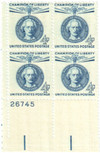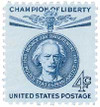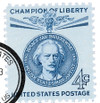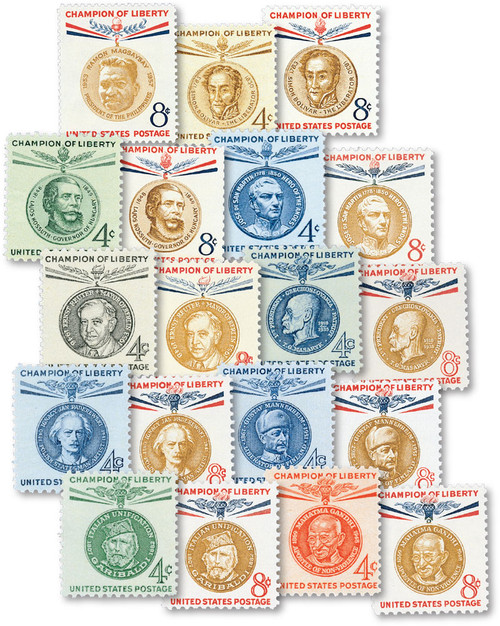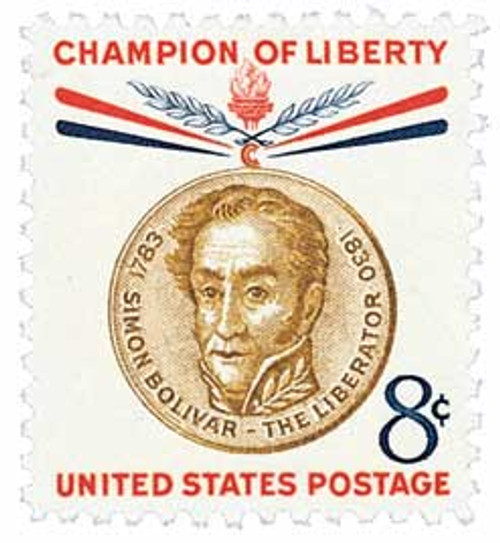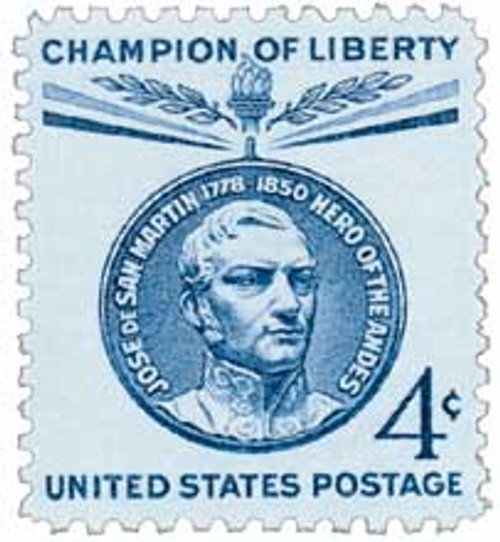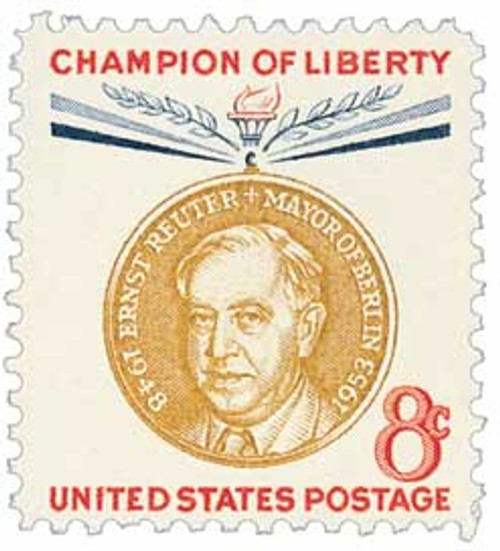
# 1159 - 1960 4c Champions of Liberty: Ignacy Paderewski
4¢ Ignacy J. Paderewski
Champions of Liberty Series
City: Washington, D.C.
Quantity: 119,798,000
Printed by: Bureau of Engraving and Printing
Printing Method: Rotary Press
Perforations: 10 1/2 x 11
Color: Blue
Ignacy Paderewski Becomes Prime Minister Of Poland
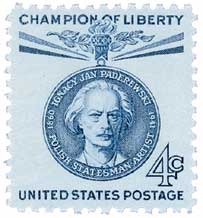
On January 18, 1919, composer-turned statesman Ignacy Paderewski was sworn in as the first Prime Minister of newly independent Poland.
Paderewski was born on November 6, 1860, in Kuryłówka, Podolia (in present-day Ukraine). Paderewski was perhaps the greatest pianist of his time, admired by all who heard him play.
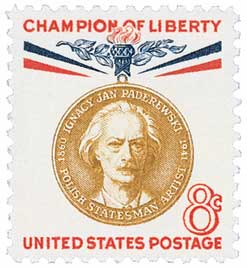
In addition to piano pieces, the Polish virtuoso composed dozens of works including operas, sonatas, and symphonies. His music was so popular that he became his own competition. While fans flocked to see him perform live at one location, one of his operas would open to a sold-out crowd across town.
At the breakout of WWI, Paderewski remained staunchly patriotic to his native Poland. He maximized on his fame to raise funds to help Poland’s war victims. He called it his new “begging” role. Paderewski joined the Polish National Committee in Paris and established the Polish Relief Fund in London. Paderewski traveled the United States seeking contributions for various relief funds and charities. Paderewski also met with President Woodrow Wilson in 1918 to ensure that Polish independence was included as point 13 in his peace terms, also known as the Fourteen Points.
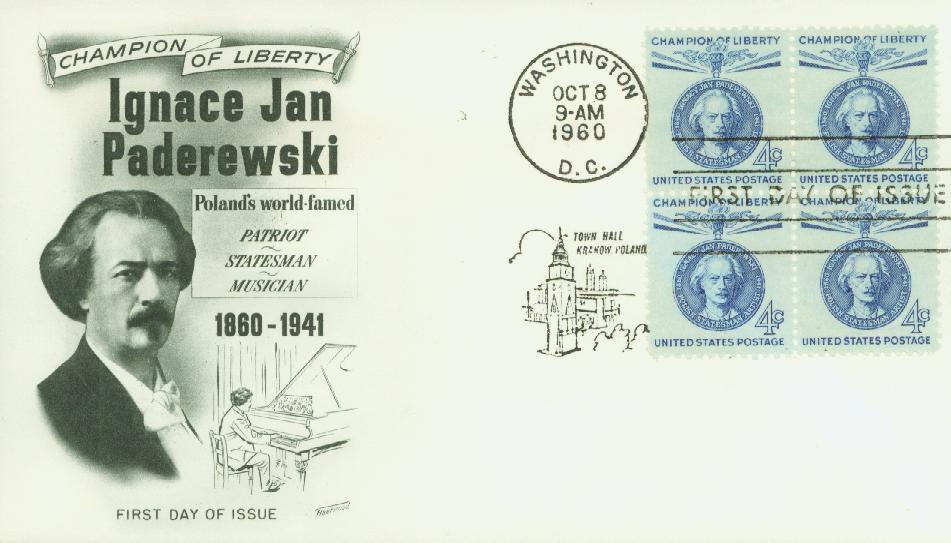
As the war came to an end and his country’s fate was uncertain, he delivered a stirring speech that sparked the Great Poland Uprising. By the start of 1919, Poland was independent. On January 16, 1919, Paderewski was sworn in as Minister of Foreign Affairs and on January 18 he became the first Prime Minister of the newly independent Poland. In these roles, he attended the Paris Peace Conference and signed the Treaty of Versailles. After resigning his post in December, he became the Polish Ambassador to the League of Nations.
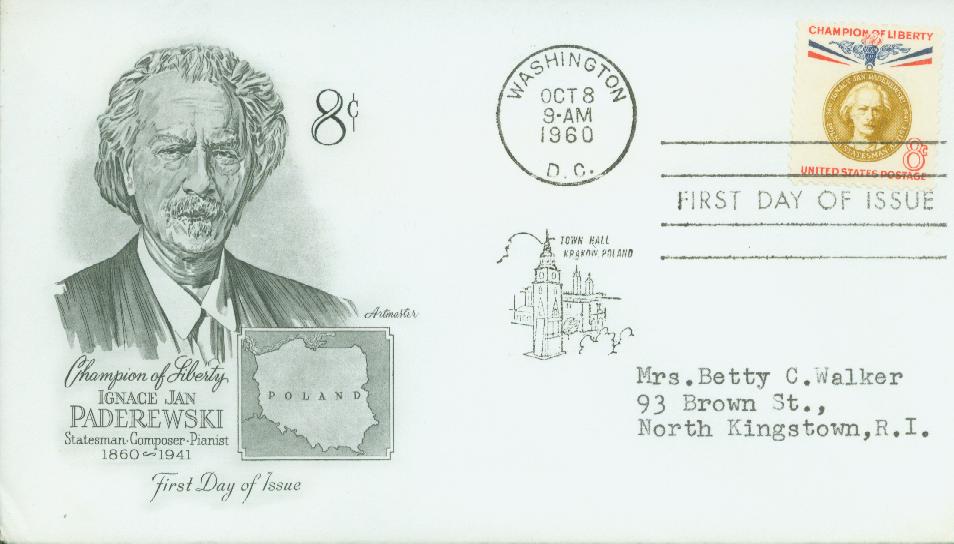
When Paderewski finally returned to the concert stage in 1922, he was again lauded as a “poet of the piano.” He held his first US concert after a long break at the famed Carnegie Hall. Fans also filled the 20,000-seat Madison Square Garden. But even with reestablished fame, he continued his philanthropic endeavors. He played charity concerts, established music scholarships, and graciously donated his own funds. From the start of WWII until his death, he again poured his efforts into Polish relief. The pianist continued to perform all over the world until his death at age 80 on June 29, 1941.
Click here for more from the Paderewski Association website.
4¢ Ignacy J. Paderewski
Champions of Liberty Series
City: Washington, D.C.
Quantity: 119,798,000
Printed by: Bureau of Engraving and Printing
Printing Method: Rotary Press
Perforations: 10 1/2 x 11
Color: Blue
Ignacy Paderewski Becomes Prime Minister Of Poland

On January 18, 1919, composer-turned statesman Ignacy Paderewski was sworn in as the first Prime Minister of newly independent Poland.
Paderewski was born on November 6, 1860, in Kuryłówka, Podolia (in present-day Ukraine). Paderewski was perhaps the greatest pianist of his time, admired by all who heard him play.

In addition to piano pieces, the Polish virtuoso composed dozens of works including operas, sonatas, and symphonies. His music was so popular that he became his own competition. While fans flocked to see him perform live at one location, one of his operas would open to a sold-out crowd across town.
At the breakout of WWI, Paderewski remained staunchly patriotic to his native Poland. He maximized on his fame to raise funds to help Poland’s war victims. He called it his new “begging” role. Paderewski joined the Polish National Committee in Paris and established the Polish Relief Fund in London. Paderewski traveled the United States seeking contributions for various relief funds and charities. Paderewski also met with President Woodrow Wilson in 1918 to ensure that Polish independence was included as point 13 in his peace terms, also known as the Fourteen Points.

As the war came to an end and his country’s fate was uncertain, he delivered a stirring speech that sparked the Great Poland Uprising. By the start of 1919, Poland was independent. On January 16, 1919, Paderewski was sworn in as Minister of Foreign Affairs and on January 18 he became the first Prime Minister of the newly independent Poland. In these roles, he attended the Paris Peace Conference and signed the Treaty of Versailles. After resigning his post in December, he became the Polish Ambassador to the League of Nations.

When Paderewski finally returned to the concert stage in 1922, he was again lauded as a “poet of the piano.” He held his first US concert after a long break at the famed Carnegie Hall. Fans also filled the 20,000-seat Madison Square Garden. But even with reestablished fame, he continued his philanthropic endeavors. He played charity concerts, established music scholarships, and graciously donated his own funds. From the start of WWII until his death, he again poured his efforts into Polish relief. The pianist continued to perform all over the world until his death at age 80 on June 29, 1941.
Click here for more from the Paderewski Association website.






